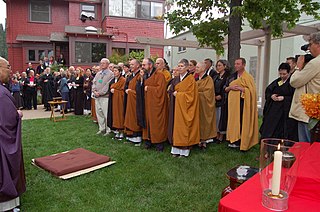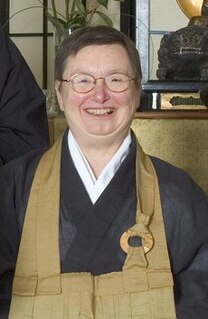Engaged Buddhism, also known as socially engaged Buddhism, refers to a Buddhist social movement that emerged in Asia in the 20th century, composed of Buddhists who are seeking ways to apply the Buddhist ethics, insights acquired from meditation practice, and the teachings of the Buddhist dharma to contemporary situations of social, political, environmental and economic suffering, and injustice. Finding its roots in Vietnam through the Thiền Buddhist teacher Thích Nhất Hạnh, Engaged Buddhism was popularised by the Indian jurist, politician, and social reformer B. R. Ambedkar who inspired the Dalit Buddhist movement in the 1950s, and has since grown by spreading to the Indian subcontinent and the West.

Richard Dudley Baker is an American Soto Zen master, the founder and guiding teacher of Dharma Sangha—which consists of Crestone Mountain Zen Center located in Crestone, Colorado and the Buddhistisches Studienzentrum (Johanneshof) in Germany's Black Forest. As the American Dharma heir to Shunryu Suzuki, Baker assumed abbotship of the San Francisco Zen Center (SFZC) shortly before Suzuki's death in 1971. He remained abbot there until 1984, the year he resigned his position after it was disclosed in the previous year that he and the wife of one of SFZC's benefactors had been having an ongoing affair. Despite the controversy connected with his resignation, Baker was instrumental in helping the San Francisco Zen Center to become one of the most successful Zen institutions in the United States.

The term American Buddhism can be used to describe all Buddhist groups within the United States, including Asian-American Buddhists born into the faith, who comprise the largest percentage of Buddhists in the country.

Hakuyū Taizan Maezumi was a Japanese Zen Buddhist teacher and rōshi, and lineage holder in the Sōtō, Rinzai, and Sanbo Kyodan traditions of Zen. He combined the Rinzai use of kōans and the Sōtō emphasis on shikantaza in his teachings, influenced by his years studying under Hakuun Yasutani in Sanbo Kyodan. He founded or co-founded several institutions and practice centers, including the Zen Center of Los Angeles, White Plum Asanga, Yokoji Zen Mountain Center and the Zen Mountain Monastery.

Zen Mountain Monastery is a Zen Buddhist monastery and training center on a 230-acre (0.93 km2) forested property in the Catskill Mountains in Mount Tremper, New York. It was founded in 1980 by John Daido Loori originally as the Zen Arts Center. It combines the Rinzai and Sōtō Zen traditions, in both of which Loori received Dharma transmission. Loori's first dharma heir was Bonnie Myotai Treace, Sensei, who received shiho, or dharma transmission, from him in 1996. From Loori's death in October 2009 until January 2015, Zen Mountain Monastery had two teachers: Geoffrey Shugen Arnold and Konrad Ryushin Marchaj, who received Dharma transmission from Loori in 1997 and 2009, respectively. Since January 2015, the training at the Monastery has been led by Shugen Roshi, assisted by Ron Hogen Green, Sensei; Jody Hojin Kimmel, Sensei; and Vanessa Zuisei Goddard, Sensei.

Bernie Glassman was an American Zen Buddhist roshi and founder of the Zen Peacemakers, an organization established in 1980. In 1996, he co-founded the Zen Peacemaker Order with his late wife Sandra Jishu Holmes. Glassman was a Dharma successor of the late Taizan Maezumi-roshi, and gave inka and Dharma transmission to several people.

Toni Packer was a teacher of "meditative inquiry", and the founder of Springwater Center. Packer was a former student in the Sanbo Kyodan lineage of Zen Buddhism, and was previously in line to be the successor of Phillip Kapleau at the Rochester Zen Center.

Joan Jiko Halifax is an American Zen Buddhist teacher, anthropologist, ecologist, civil rights activist, hospice caregiver, and the author of several books on Buddhism and spirituality. She currently serves as abbot and guiding teacher of Upaya Zen Center in Santa Fe, New Mexico, a Zen Peacemaker community which she founded in 1990. Halifax-roshi has received Dharma transmission from both Bernard Glassman and Thich Nhat Hanh, and previously studied with the Korean master Seung Sahn. In the 1970s she collaborated on LSD research projects with her ex-husband Stanislav Grof, in addition to other collaborative efforts with Joseph Campbell and Alan Lomax. She is founder of the Ojai Foundation in California, which she led from 1979 to 1989. As a socially engaged Buddhist, Halifax has done extensive work with the dying through her Project on Being with Dying. She is on the board of directors of the Mind and Life Institute, a non-profit organization dedicated to exploring the relationship of science and Buddhism.

White Plum Asanga, sometimes termed White Plum Sangha, is a Zen school in the Hakuyu Taizan Maezumi lineage, created by Hakuyu Taizan Maezumi. It consists of Maezumi's Dharma heirs and subsequent successors and students. A diverse organization spread across the United States and with a small presence in Europe, the White Plum Asanga
[I]ncludes teachers who represent the spectrum of styles to be found to American Zen—socially engaged Buddhism, family practice, Zen and the arts, secularized Zen, and progressive traditionalism."

Yokoji Zen Mountain Center is a year-round Zen Buddhist training and retreat center located in the San Jacinto Mountains of Southern California. It is a 160 acres of sacred Native American land and wilderness.
Below is a timeline of important events regarding Zen Buddhism in the United States. Dates with "?" are approximate.

Gyokuko Carlson is a Soto Zen roshi and abbess of Dharma Rain Zen Center in Portland, Oregon, United States.

The phrase Zen center was coined by American students of Shunryu Suzuki in the mid-twentieth century, and the San Francisco Zen Center became the first Zen center, incorporating in 1962. Neither temples nor monasteries, Zen centers occupy a unique place in the historical development of Zen Buddhism and of Buddhism in the United States.
The Pacific Zen Institute (PZI), is a Zen Buddhist practice center in Santa Rosa, California. Established in 1999, it has several affiliate centers in the lineage of John Tarrant, a dharma heir of Robert Baker Aitken, and formerly of the Sanbo Kyodan school of Zen.

Geoffrey Shugen Arnold is Rōshi of the Mountains and Rivers Order (MRO) founded by John Daido Loori, from whom Shugen received shiho, or dharma transmission, in July 1997. As a lineage holder in the Sōtō tradition, Shugen currently serves as head of MRO and abbot of Zen Mountain Monastery in Mt. Tremper, New York, where he serves as the full-time resident teacher. Trained as a musician, Shugen was introduced to and began practicing Zen meditation in 1975. He began his formal training at Zen Mountain Monastery in 1984, and received tokudo, full monastic ordination, in 1988. Shugen's teachings have appeared in various Buddhist publications, including Buddhadharma: The Practitioner's Quarterly, The Mountain Record and in The Best Buddhist Writing 2005 and 2009. His dharma talks are available for sale through the Monastery Store and as a free podcast at WZEN.org. He is the author of O, Beautiful End, a collection of Zen memorial poems, published by Dharma Communications in 2012.
Michael Danan Henry is an American Roshi in the Harada-Yasutani lineage, a Zen sect derived from both the Rinzai and Sōtō traditions of Japanese Zen, practicing in the Diamond Sangha lineage of Robert Baker Aitken. The founding teacher of the Zen Center of Denver, Henry received Dharma transmission from Philip Kapleau Roshi in 1989 and was subsequently recognized as a Diamond Sangha teacher and Diamond Sangha master by Robert Baker Aitken. Danan Henry Roshi created and implemented the Monastery Without Walls training program; the Lotus in the Flame Lay Order; and the "Every Minute Zen" mindfulness practice as abbot and spiritual director of the Zen Center of Denver.
The Zen Peacemakers is a diverse network of socially engaged Buddhists, currently including the formal structures of the Zen Peacemakers International, the Zen Peacemaker Order and the Zen Peacemaker Circles, many affiliated individuals and groups, and communities formed by Dharma Successors of Roshi Bernie Glassman. It was founded by Bernie Glassman and his second wife Sandra Jishu Holmes in 1996, as a means of continuing the work begun with the Greyston Foundation in 1980 of expanding Zen practice into larger spheres of influence such as social services, business and ecology but with a greater emphasis on peace work. Eve Marko, Bernie Glassman’s third wife, is a founding teacher of the Zen Peacemaker Order. Zen Peacemakers have developed from the White Plum Asanga lineage of Taizan Maezumi.
Zen was introduced in the United States at the end of the 19th century by Japanese teachers who went to America to serve groups of Japanese immigrants and become acquainted with the American culture. After World War II, interest from non-Asian Americans grew rapidly. This resulted in the commencement of an indigenous American Zen tradition which also influences the larger western (Zen) world.

Harvey Daiho Hilbert Roshi is a psychotherapist and an expert on post-Vietnam stress syndrome. He is an ordained Soto Zen priest and the founding abbot of the Order of Clear Mind Zen and a leader of the Zen community in southern New Mexico. He was featured in a documentary on Vietnam Veterans that aired on both National Public Radio's "Morning Edition" and PBS station KRWG-TV. During combat in the Vietnam War Hilbert was shot in the head, leaving him paralyzed on the left side of his body. Despite his injuries, Hilbert went on to college.
New York Zen Center for Contemplative Care is a Soto Zen practice center in Manhattan. It was founded in 2007 by Zen teachers and monks Koshin Paley Ellison and Robert Chodo Campbell. In addition to Soto Zen Buddhist practice and study, NYZC offers training in end-of-life care for medical professionals, carepartners, and those who are dying. Since the Zen center was founded, the priests and their students have worked with over 150,000 people. New York Zen Center for Contemplative Care offers the first fully-accredited Zen Buddhist Clinical Pastoral Education program in the United States.
























